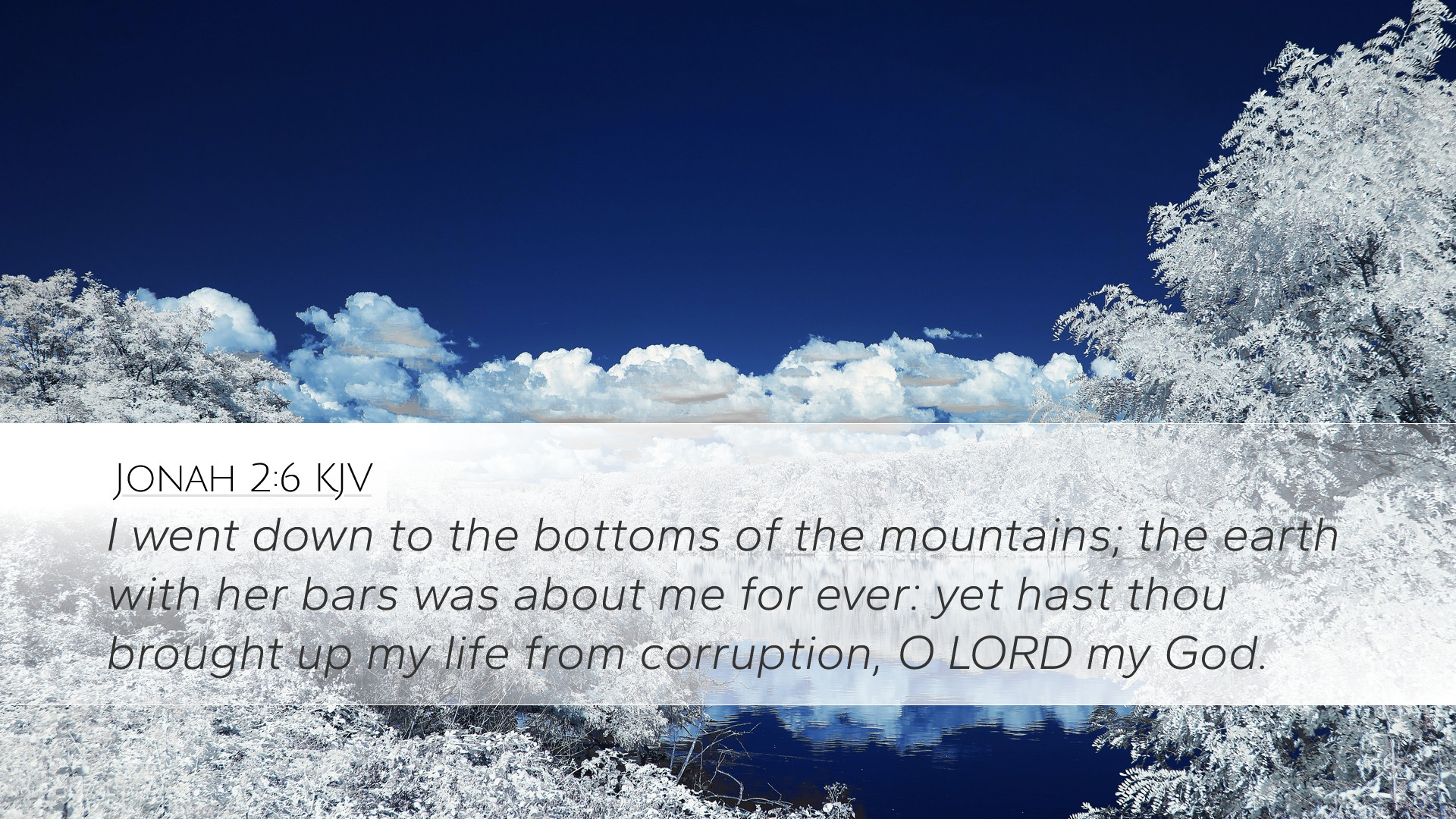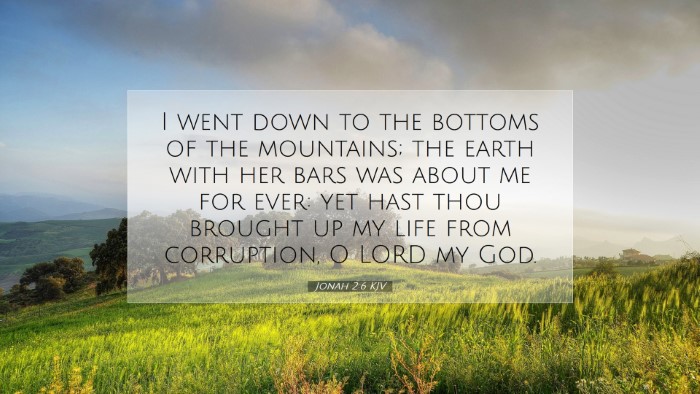Old Testament
Genesis Exodus Leviticus Numbers Deuteronomy Joshua Judges Ruth 1 Samuel 2 Samuel 1 Kings 2 Kings 1 Chronicles 2 Chronicles Ezra Nehemiah Esther Job Psalms Proverbs Ecclesiastes Song of Solomon Isaiah Jeremiah Lamentations Ezekiel Daniel Hosea Joel Amos Obadiah Jonah Micah Nahum Habakkuk Zephaniah Haggai Zechariah MalachiJonah 2:6
Jonah 2:6 KJV
I went down to the bottoms of the mountains; the earth with her bars was about me for ever: yet hast thou brought up my life from corruption, O LORD my God.
Jonah 2:6 Bible Commentary
Commentary on Jonah 2:6
Jonah 2:6 reads: “I went down to the bottoms of the mountains; the earth with her bars was about me for ever: yet hast thou brought up my life from corruption, O Lord my God.” This verse is from one of the most poetically profound sections of the prophetic book of Jonah, encapsulating the themes of despair, deliverance, and divine mercy.
Contextual Overview
Jonah, a prophet of Israel, initially disobeys God’s command to preach to Nineveh, fleeing on a ship. Following a storm, he is thrown overboard and swallowed by a great fish, where he spends three days and nights. Jonah 2 captures his deep repentance and prayer during this period of confinement. His prayer is a dramatic reflection on his dire circumstances and a plea for divine intervention.
Insights from Public Domain Commentaries
Matthew Henry's Commentary
Matthew Henry highlights the profound imagery of depths—both literal and metaphorical. He notes that “I went down to the bottoms of the mountains” illustrates Jonah's descent into despair and hopelessness. This reference to the depths alludes not only to the physical depths of the sea but also to the spiritual low in which Jonah finds himself, feeling abandoned and enveloped by darkness.
Henry elaborates on the phrase “the earth with her bars was about me for ever.” He interprets the “bars” as a representation of a prison, illustrating Jonah’s imprisonment by the circumstances of his own making—his disobedience to God. Yet, amidst this darkness, Henry emphasizes that Jonah recognizes God’s agency in lifting him from the brink of death—a key theme of redemption permeating the text.
Albert Barnes' Notes on the Bible
Albert Barnes explores the theological implications of Jonah’s prayer. He notes the significance of Jonah's acknowledgement of the “bottoms of the mountains,” indicating that even in the most desperate situations, God’s presence is still active. Barnes argues that this verse serves as a reminder that even when one feels utterly forsaken by both God and man, divine help is still attainable through repentance and prayer.
Barnes aligns Jonah's situation with that of the believer in distress, suggesting that this verse offers hope to those who find themselves at their lowest. He emphasizes that God’s capacity to save extends beyond human comprehension, showcasing His sovereign power to redeem His people from death and despair.
Adam Clarke's Commentary
Adam Clarke provides a detailed interpretation of the imagery used in this verse. He points out that “the bottoms of the mountains” can symbolize both the gravity of Jonah’s spiritual condition and the reality of human sinfulness. Clarke elaborates on this by asserting that while Jonah is physically submerged in the sea, he is also submerged in his disobedience and rebellion against God’s calling.
Clarke also contextualizes Jonah’s experience by comparing it to other biblical narratives where God’s deliverance manifests in seemingly hopeless situations. His concluding thought emphasizes the importance of recognizing God’s mercy, affirming that “yet hast thou brought up my life from corruption” signifies that no action taken against God’s will places one beyond the scope of His redemptive grace.
Theological Reflections
Combining insights from these commentaries, several theological reflections emerge from Jonah 2:6:
- Descent into Despair: The imagery of “going down” serves as a metaphor for both physical and spiritual decline. This draws parallels to the human condition—often spiraling into despair due to sin and rebellion.
- Divine Mercy: The verse encapsulates the idea that God’s mercy prevails even in the darkest moments. Jonah’s deliverance demonstrates that repentance opens a pathway back to God, regardless of one’s past transgressions.
- Hope in Desperation: The narrative encourages believers to seek God earnestly in times of trouble. It instills the belief that deliverance is possible, highlighting God’s role as the redeemer of lost souls.
- The Universality of God’s Reach: Jonah's experience showcases that God’s reach extends to all, including those who stray far from Him. This universality calls for reflection on the boundaries of grace and the extensive nature of divine forgiveness.
Conclusion
Jonah 2:6 is a testimony not just of despair but of hope and redemption. The combined insights from Matthew Henry, Albert Barnes, and Adam Clarke affirm that regardless of the depths one may encounter—whether physical, emotional, or spiritual—God is always at work, ready to restore and redeem those who genuinely seek Him. This verse serves as a powerful reminder to pastors, students, theologians, and Bible scholars that, in the narrative of Jonah, we find both a profound lament and a glorious proclamation of God’s unfailing promise to redeem his people, drawing them back from corruption into the light of His life.


